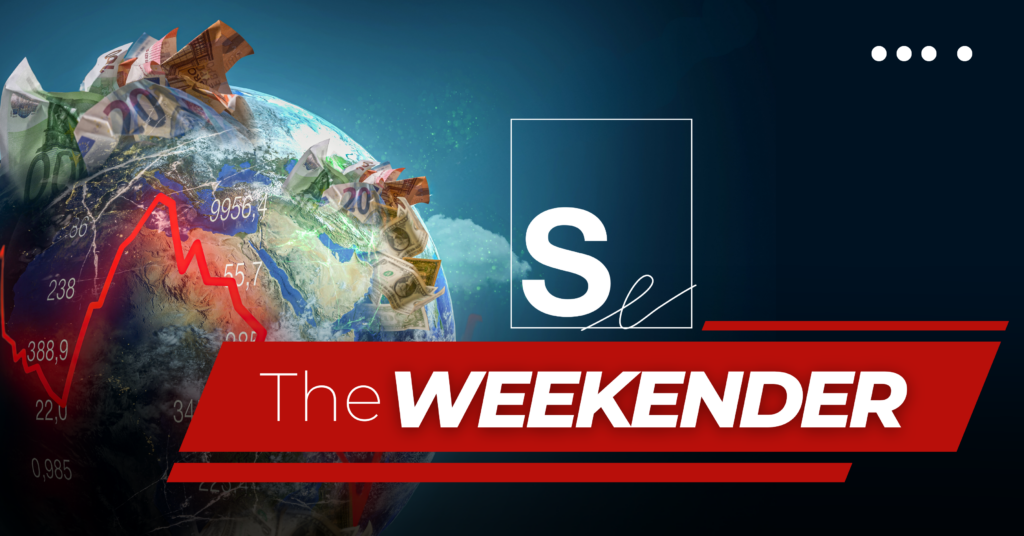DATA POINTS
- 25: The number of Republican Governors who signed a letter supporting Texas in the border control fight
- 39%: The percentage Punxsutawney Phil has been right on Groundhog Day
- $934,252: San Francisco 49ers’ Brock Purdy’s salary; the lowest paid starting quarterback in the NFL
- $100 Million: The amount that SiriusXM paid to buy the SmartLess podcast, run by Jason Bateman, Will Arnett and Sean Hayes
- 114.2 Million: The number of people who watched the Super Bowl last year
- $55 Billion: The amount a Delaware judge says Elon Musk must give up in Tesla pay package
Ground Control to Farmer Tom
Before humans adopted formal calendars, farmers throughout history would watch the stars and read the constellations to plan their agricultural seasons. Today, satellites are looking back to ensure farmers are receiving all the support that they need to be successful.
John Deere, the world’s largest farm machinery manufacturer, has been reaping what it’s sown in its technological innovations. Its herd of modern equipment utilizes computer-assisted software to increase farm efficiency, including everything from instruments that distinguish crops from weeds to entirely driverless tractors. The (unsurprising) problem: rural American farmland has poor broadband connectivity.
Enter Starlink.
With 5,300 working satellites in orbit, SpaceX’s Starlink can provide an internet connection to just about anywhere on the planet, including war-torn Ukraine and countries struck by natural disasters. John Deere signed a deal with Elon Musk’s company to provide connectivity services to its fleet across the world – first debuting in Brazil and parts of the U.S. While farmers’ costs for receiving and implementing the orbital connection are still undetermined, the deal offers the agricultural community more opportunities to leverage the best tech in the business.
Read More at The Wall Street Journal
What do Economists and Meteorologists Have in Common?

It’s been a bit of luck, however, that the U.S. no longer needs to pack an umbrella when compared to other countries continuing to endure economic thunderstorms. Japan’s shrinking population and low immigration restricts its growth potential. The United Kingdom is still reeling from Brexit supply chain disruptions while the remainder of the European Union, bound by reliance on Russian oil and gas, have tried to power through their growth without the energy needed to do so.
While the sun is shining on the U.S. economic outlook, most Americans are not packing for the beach. 2023 saw a 12% decline in workers quitting or changing jobs and paycheck growth slowed; both are indicators of low confidence in the labor market. On top of this, the Federal Reserve’s fight against inflation will continue to hurt some sectors.
Despite some ambivalence from workers, economists are pointing to a strong year for the U.S. economy. As the popular saying goes, however, economists and meteorologists are the only two professions where you can be wrong 50% of the time and keep your job. Not only that, but do people believe the numbers? Economic statistics often don’t align with public perceptions, which can matter a great deal in election years.
Crossing the Border into Impeachment Territory

The first article asserts Sec. Mayorkas has failed to enforce U.S. immigration policies along the southern border while ignoring Congressional laws and court orders. The second invokes a “breach of public trust,” accusing Mayorkas of obstructing oversight of the DHS and willfully lying. While the GOP-controlled House may vote in favor of impeachment, it is likely doomed to fail in the Democrat-controlled Senate.
While Republicans are hoping to have Sec. Mayorkas removed from office for allegedly neglecting his responsibilities, he has spent weeks on Capitol Hill negotiating a bipartisan agreement that would tie immigration reform to Ukrainian funding. After former President Donald Trump, who hopes to run his own immigration platform, disparaged the bill, several Republicans in both chambers backed out of their support for the package.
Read More at The Washington Post
Bad news for TikTok Swifties
Swifties may have a hard time Shaking this Off. Universal Music Group (UMG) has removed all its artists’ music from TikTok, everything from Taylor Swift to the Beatles. Taylor Swift’s account currently has an impressive 23.9 million followers, with many of her videos centered around her music. TikTok has become a modern way of sharing music with others and is often how people discover new music. The app is known for contributing to already-established artists and propelling previously little-known artists into the spotlight. Like many other social media sites, TikTok has also been a platform for fans to assemble over their shared love for their favorite superstars.
On the other hand, the levels of engagement and pay coming from artists’ TikTok presence were not convincing enough for UMG to keep its artists on the notorious app. UMG remains unconvinced that TikTok was worth the relatively low royalties its artists received. In addition to frustration over TikTok underpaying artists relative to other platforms, UMG also expressed concern over AI’s potential to steal its artists’ intellectual property. TikTok fired back, calling UMG’s actions “self-serving” and “not in the best interests of artists, songwriters and fans.” UMG is standing its ground on its decision to remove all its artists from TikTok and will pursue opportunities for its artists elsewhere.
Divergent Schools of Thought on Diversity Schooling

Conservative think tanks and politicians are asserting that antiracism and DEI courses not only undermine traditional education on American history but make white students feel guilty about the past. Advocates for DEI adoption insist that the programs are rooted in empathy and help persons of color attain greater achievement on the same footing and path as their white colleagues.
The discussion around DEI and its surrounding issues is not new, but it is more heated at this point in time and taking place from dinner tables to social media, to the national campaign stage and beyond.
See you next week!
Be sure to follow us on Facebook, Twitter, and LinkedIn for more news and industry updates. To receive a copy of The Weekender in your inbox, sign up here.







